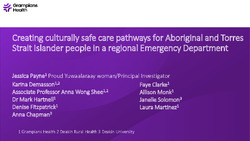Please use this identifier to cite or link to this item:
http://hdl.handle.net/11054/2933Full metadata record
| DC Field | Value | Language |
|---|---|---|
| dc.contributor | Payne, Jessica | en_US |
| dc.contributor | Demasson, Karina | en_US |
| dc.contributor | Wong Shee, Anna | en_US |
| dc.contributor | Hartnell, Mark | en_US |
| dc.contributor | Fitzpatrick, Denise | en_US |
| dc.contributor | Clarke, Faye | en_US |
| dc.contributor | Monk, Allison | en_US |
| dc.contributor | Chapman, Anna | en_US |
| dc.contributor | Solomon, Janelle | en_US |
| dc.contributor | Martinez, Laura | en_US |
| dc.date.accessioned | 2025-01-14T03:35:37Z | - |
| dc.date.available | 2025-01-14T03:35:37Z | - |
| dc.date.issued | 2024 | - |
| dc.identifier.govdoc | 02851 | en_US |
| dc.identifier.uri | http://hdl.handle.net/11054/2933 | - |
| dc.description.abstract | Background/aim: Aboriginal and Torres Strait Islander (herein Aboriginal) people are more likely to leave an emergency department (ED) prior to being seen or prior to treatment completion than non-indigenous people. These leave events result in incomplete and or incorrect medical treatment and are strongly associated with re-presentation and admission, impacting on ongoing medical care and increasing morbidity and mortality rates. These leave events can have a devastating impact on the individual, family and community. There are personal, structural and systemic causes for these ‘leave events’, such as experience of racism, distrust in the health system and lack of cultural safety. A recently completed a quality improvement project to enable isolation of leave event data for Aboriginal people in the Grampians Health (GH) ED, showed that Aboriginal patients are twice as likely to leave at own risk with incomplete treatment as non-indigenous Australians. The aim of this study is to improve access to the ED for Aboriginal people through a culturally informed co-design process to adapt an existing culturally safe ED model of care to the context of the GH ED. Population/setting: Aboriginal people requiring care and health professionals providing care at the Grampians Health ED. Methods: This research translation project will have two phases: Phase 1 will involve a synthesis of the evidence of culturally safe models of care and strategies for implementation. Yarning circles with community as well as co-design with Grampians Health staff/stakeholders will be conducted to adapt an evidence-based culturally safe ED model of care to the local context using the 8 ways of Aboriginal Learning and co-design frameworks. Phase 2 will involve the implementation of the co-designed ED model of care using a recognised culturally safe implementation framework e.g. the Heart Foundation toolkit for quality improvement. Translational impact/implications for future practice: Changes to local policy, clinical guidelines and models of care to create culturally safe pathways; Improve cultural safety, competency and responsiveness of the service; Reduce the number of leave events and improve care and outcomes for Aboriginal people; Increased identification as Aboriginal; Improve staff satisfaction through improved understanding and delivery of culturally and clinically competent care for our Aboriginal patients and their families. | en_US |
| dc.description.provenance | Submitted by Gemma Siemensma (gemmas@bhs.org.au) on 2024-11-27T01:44:35Z No. of bitstreams: 1 Culturally safe care pathways in ED_FINAL.pdf: 491093 bytes, checksum: c9e485e61091ce63fd6bcd8a1f555276 (MD5) | en |
| dc.description.provenance | Approved for entry into archive by Gemma Siemensma (gemmas@bhs.org.au) on 2025-01-14T03:35:37Z (GMT) No. of bitstreams: 1 Culturally safe care pathways in ED_FINAL.pdf: 491093 bytes, checksum: c9e485e61091ce63fd6bcd8a1f555276 (MD5) | en |
| dc.description.provenance | Made available in DSpace on 2025-01-14T03:35:37Z (GMT). No. of bitstreams: 1 Culturally safe care pathways in ED_FINAL.pdf: 491093 bytes, checksum: c9e485e61091ce63fd6bcd8a1f555276 (MD5) Previous issue date: 2024 | en |
| dc.title | Creating culturally safe care pathways for Aboriginal and Torres Strait Islander people in a regional Emergency Department (ED). | en_US |
| dc.type | Conference | en_US |
| dc.type.specified | Presentation | en_US |
| dc.bibliographicCitation.conferencedate | November 11-12 | en_US |
| dc.bibliographicCitation.conferencename | Western Alliance Annual Symposium | en_US |
| dc.bibliographicCitation.conferenceplace | Lorne, Australia | en_US |
| dc.subject.healththesaurus | EMERGENCY DEPARTMENT | en_US |
| dc.subject.healththesaurus | CULTURALLY SENTITIVE PRACTICE | en_US |
| dc.subject.healththesaurus | INDIGENOUS POPULATIONS | en_US |
| dc.subject.healththesaurus | ABORIGINAL HEALTH | en_US |
| Appears in Collections: | Research Output | |
Files in This Item:
| File | Description | Size | Format | |
|---|---|---|---|---|
| Culturally safe care pathways in ED_FINAL.pdf | 479.58 kB | Adobe PDF |  View/Open |
Items in DSpace are protected by copyright, with all rights reserved, unless otherwise indicated.
